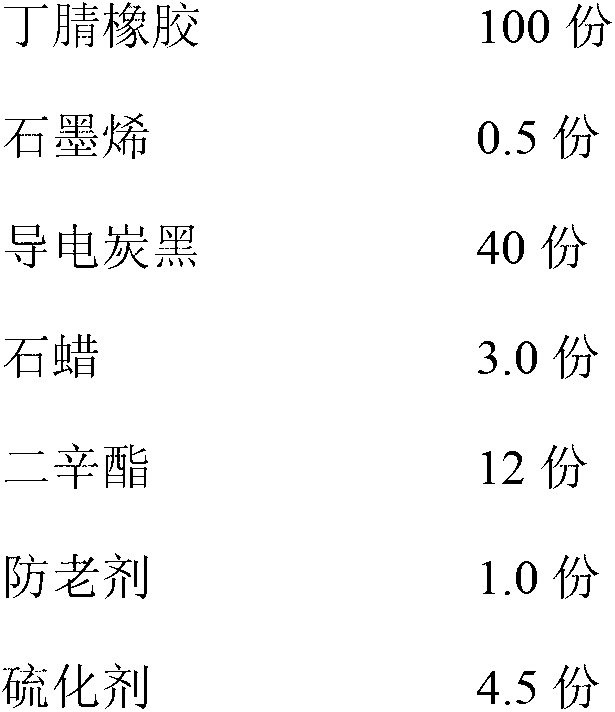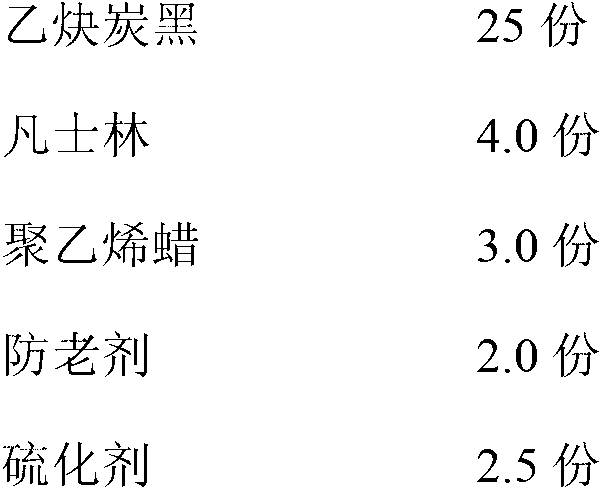Strippable semiconductive shielding rubber for rubber insulation and preparation method thereof
A semi-conductive and rubber technology, applied in the direction of power cables with shielding/conducting layers, etc., can solve the problems of unsatisfactory, uneven dispersion of carbon black, thermal aging and electrical aging of products, and achieve the effect of avoiding performance deviation.
- Summary
- Abstract
- Description
- Claims
- Application Information
AI Technical Summary
Problems solved by technology
Method used
Image
Examples
Embodiment 1
[0024]
[0025] The nitrile rubber is a polar rubber system with an acrylonitrile content of 33%; the anti-aging agent is quinoline anti-aging agent RD; the vulcanizing agent is dicumyl peroxide.
[0026] Implementation process:
[0027] Masticating: After weighing the relevant materials according to the proportion, masticate the nitrile rubber. The masticating temperature is controlled at 80°C. After the mastication is completed, place it for 12 hours before carrying out the subsequent mixing operation.
[0028] Mixing: During the mixing operation, first add graphene to the nitrile rubber, after mixing evenly, add 1 / 2 conductive carbon black, add the remaining carbon black, paraffin and dioctyl ester after about 3 minutes, and then mix After 2 minutes, add other processing aids, and finally add vulcanizing agent and mix for 1 minute before unloading. The temperature during the whole mixing process should not exceed 120°C.
[0029] Film output: After unloading, the semi-c...
Embodiment 2
[0031]
[0032]
[0033] The acrylonitrile content of the nitrile rubber is 26%; the anti-aging agent is diphenylamine anti-aging agent HS911; the vulcanizing agent is bis-tert-butylperoxycumene.
[0034] Implementation process:
[0035] The difference between the implementation steps of this example and the implementation mode and Example 1 is that the graphene is first added to the nitrile rubber during the mixing process, and 1 / 2 of the acetylene carbon black is added after the mixing is uniform, and the remaining acetylene carbon black is added after about 3 minutes. Acetylene carbon black, Vaseline and polyethylene wax, and then knead for 2 minutes before adding other processing aids, and finally add vulcanizing agent and knead for 1 minute before unloading. The temperature of the whole mixing process does not exceed 120 °C.
Embodiment 3
[0037]
[0038] The acrylonitrile content of the nitrile rubber is 28%; the anti-aging agent is quinoline anti-aging agent RD; the vulcanizing agent is dicumyl peroxide.
[0039] Implementation process:
[0040] The difference between the implementation steps of this example and the implementation mode and Example 1 is that the graphene is first added to the nitrile rubber during the mixing process, and 1 / 2 of the conductive carbon black is added after the mixing is uniform, and the remaining carbon black is added after about 3 minutes. Conductive carbon black and dioctyl ester, then add other processing aids after mixing for 2 minutes, and finally add vulcanizing agent and mix for 1 minute before unloading. The temperature of the whole mixing process does not exceed 120 °C.
[0041] Take a certain amount of mixed rubber in the example, vulcanize it on a flat vulcanizing machine at 160°C for 30 minutes, press it into a test piece with a thickness of 2mm, and press it into a...
PUM
| Property | Measurement | Unit |
|---|---|---|
| electron mobility | aaaaa | aaaaa |
| electrical resistivity | aaaaa | aaaaa |
| tensile strength | aaaaa | aaaaa |
Abstract
Description
Claims
Application Information
 Login to View More
Login to View More - R&D
- Intellectual Property
- Life Sciences
- Materials
- Tech Scout
- Unparalleled Data Quality
- Higher Quality Content
- 60% Fewer Hallucinations
Browse by: Latest US Patents, China's latest patents, Technical Efficacy Thesaurus, Application Domain, Technology Topic, Popular Technical Reports.
© 2025 PatSnap. All rights reserved.Legal|Privacy policy|Modern Slavery Act Transparency Statement|Sitemap|About US| Contact US: help@patsnap.com



